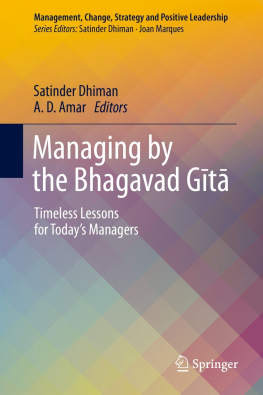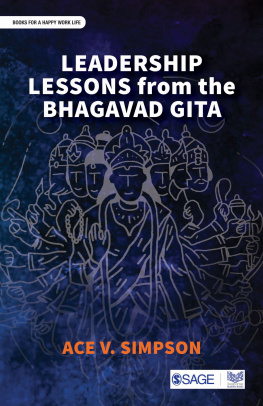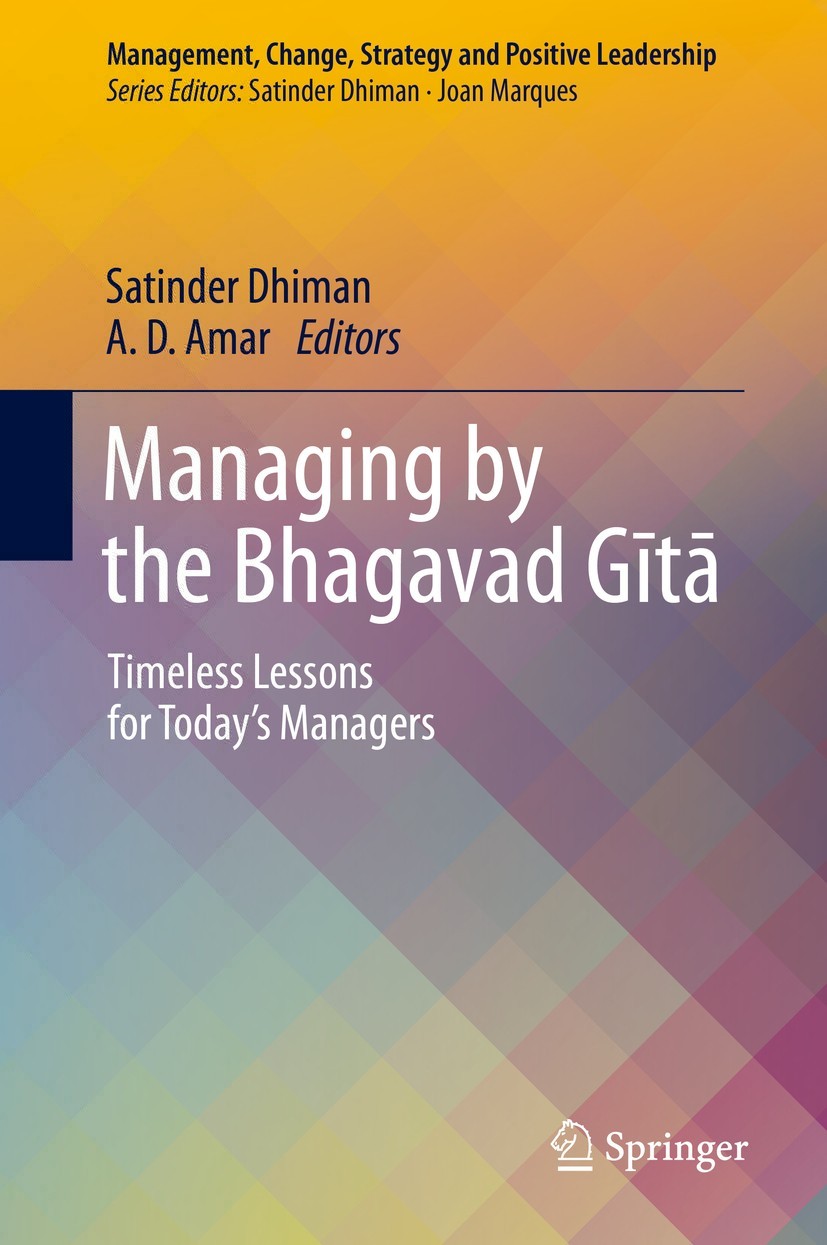Management, Change, Strategy and Positive Leadership
Series Editors
Satinder Dhiman
School of Business, Woodbury University, Burbank, CA, USA
Joan Marques
School of Business, Woodbury University, Burbank, CA, USA
More information about this series at http://www.springer.com/series/15772
Editors
Satinder Dhiman and A. D. Amar
Managing by the Bhagavad Gt Timeless Lessons for Todays Managers
Editors
Satinder Dhiman
School of Business, Woodbury University, Burbank, CA, USA
A. D. Amar
W. Paul Stillman School of Business, Seton Hall University, South Orange, NJ, USA
ISSN 2524-6070 e-ISSN 2524-6089
Management, Change, Strategy and Positive Leadership
ISBN 978-3-319-99610-3 e-ISBN 978-3-319-99611-0
https://doi.org/10.1007/978-3-319-99611-0
Library of Congress Control Number: 2018960830
Springer Nature Switzerland AG 2019
This work is subject to copyright. All rights are reserved by the Publisher, whether the whole or part of the material is concerned, specifically the rights of translation, reprinting, reuse of illustrations, recitation, broadcasting, reproduction on microfilms or in any other physical way, and transmission or information storage and retrieval, electronic adaptation, computer software, or by similar or dissimilar methodology now known or hereafter developed.
The use of general descriptive names, registered names, trademarks, service marks, etc. in this publication does not imply, even in the absence of a specific statement, that such names are exempt from the relevant protective laws and regulations and therefore free for general use.
The publisher, the authors, and the editors are safe to assume that the advice and information in this book are believed to be true and accurate at the date of publication. Neither the publisher nor the authors or the editors give a warranty, express or implied, with respect to the material contained herein or for any errors or omissions that may have been made. The publisher remains neutral with regard to jurisdictional claims in published maps and institutional affiliations.
This Springer imprint is published by the registered company Springer Nature Switzerland AG
The registered company address is: Gewerbestrasse 11, 6330 Cham, Switzerland
Dedication by Satinder Dhiman
r Krpaamastu
:
tvadya vastu govindatubhyameva samarpaye:
O Lord! I offer unto Thee
What is really Thine only!
I dedicate this book to my esteemed mother
Shanti Devi
the embodiment of peace and selfless service
whose love and blessings have been my strength.
Dedication by A. D. Amar
I dedicate this book to my respected mother, Kaushlya Devi Shakir, for starting me on the Bhagavad Gita when I could barely read; to my revered father, the late Prem Dutt Shakir, Esq., who fascinated me by instilling in me the teachings of the ancient Indian writings led by the Bhagavad Gita. I also dedicate this to my beloved wife, Sneh Lata Amar; our caring sons, Harpriye Amar Juneja and Januj Amar Juneja; and my best gifts from my parents, my seven siblings, Mrs. Amrit Bala Mendiratta, Dr. Mrs. Mohan Bala Chitkara, Mrs. Urmil Devi Chawla, Professor Dr. Gobind Krishan Malik, Mrs. Veena Madaan, Mr. Gopal Krishan Juneja, Esq., and Mr. Bhupesh Kumar Juneja for putting up with me, always giving me the highest priority, and being company, coplayers, partners and supporters.
Preface
The Bhagavad Gt, a philosophical poem par excellence, has been extolled as the scripture of scriptures within the corpus of Indian spiritual texts. Its unusual battlefield setting, highly practical orientation, and deep philosophical import have endeared it to people from all walks of life looking for guidance in both the sacred and secular realms. While there are many books that aspire to present spiritual truths in practical terms, perhaps, there is no other book which presents such an integral vision of attaining the ultimate purpose of life ( moks.a or liberation) while fully engaged in the activities of life.
The Bhagavad Gt is as pertinent in the boardrooms of the twenty-first century as it was on the battlefields of ancient times. Within the compass of eighteen dynamic chapters, it unfolds the whole spectacle of human drama full of challenges met, fights won, and freedom attained. It teaches us how to emerge from a state of utter apathy, gloom, sorrow, and dejection to a state of perfect engagement, understanding, clarity, wisdom, renewed strength, and triumph. The Bhagavad Gt (a part of the great Indian epicthe Mahbhrata ) can be approached as a powerful tool for management and as a catalyst for organizational transformation. It teaches us how to harmonize the needs of the individual with the needs of society, and by extension, how to harmonize the needs of employees and the organization. It employs an inside-out leadership development approach based on self-knowledge and self-mastery, the two highly important areas for practicing true self-leadership. It is a nonsectarian spiritual text with a universal message.
The Gt contains timeless management and leadership lessons for the contemporary organizations. Modern leadership concepts such as vision, motivation and empowerment, self-awareness, self-mastery, excellence in work, importance of ethical means in achieving righteous ends, attaining meaning and fulfillment at work, service before self, and well-being of all beings are all lucidly discussed in the Bhagavad Gt. Likewise, many contemporary leadership constructs such as authentic leadership, servant leadership, and values-based leadership were already discussed, albeit notionally, in the Bhagavad Gt thousands of years ago. The message of the Gt fosters holistic development of human personality within all of its dimensions (physical-psychological, emotional, intellectual, and spiritual) by providing guidance about the three essential spiritual practices: training the mind, transforming the passions, and guarding the heart.
The Bhagavad Gt teaches that only the knowers of Self are truly wise and ever free from grief. It removes sorrow by removing the self-ignorance that is causing it. According to the Gt, all our existential problems ultimately stem from self-ignorancenot knowing who we truly are. The Gt teaches that one who acts with knowledge and devotion, without desire and unattached, is liberated already. Therefore, by all our seeking, let us seek Self-Knowledge.
The Gt says that nothing can give you real happiness except your Self ( tmany evtman tus.t.ah. : BG, 2.55).
The Gt teaches renunciation in action, not renunciation of action. Renounce desire and attachment, not action, states the most important verse on Karma Yoga in the Gt (2.47). It teaches us to let go of the sense of me and mine and work selflessly for the common good. In the Gts view, serving others is serving the Divine. The sage leader outwardly does all activities like others, inwardly unattached. This is the essence of Karma Yoga of the Bhagavad Gt .
Wise leaders do everything without selfish motive, remaining equanimous in success and failure, pleasure and pain, joy and sorrowoffering their work as a loving service to the Supreme. They work for the purification of their mind (















